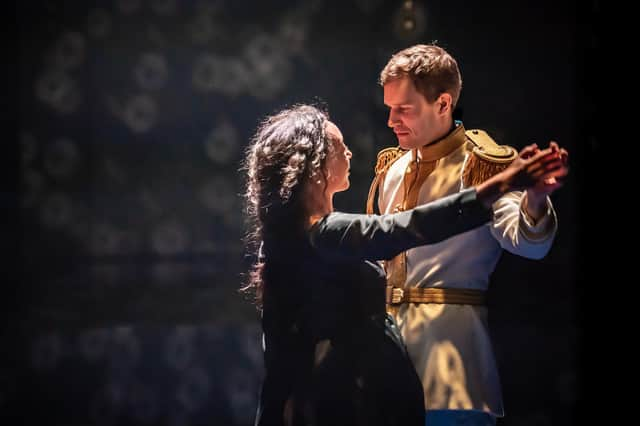Page to stage


The thing about ‘schemes’ and ‘initiatives’ in any creative industry is that they’re all well and good, but eventually you have to let the people on those schemes start firing with live ammunition, as it were.
Hats off to the folk at Sheffield Theatres then who, for the past few years, have given the people on the Regional Theatre Young Director Scheme essentially a rocket launcher over the past few years.
Advertisement
Hide AdAdvertisement
Hide AdThe RTYDS Associate Artistic Director Scheme is a programme that provides an opportunity to directors who are gaining and experience and have shown promise to move up a gear. And how.
Anthony Lau is the Sheffield Theatres’ current RTYDS incumbent and, like the person who had the role before him, hasn’t been given a small show in the studio to direct, as you might expect if you have any experience of schemes or initiatives yourself. No, he’s directing a Russian classic, one of the greatest stories of classic world literature on one of the world’s most famous stages.
It’s extraordinary stuff. Lau is taking it in his stride.
“I’ve always been interested in big plays that tell big stories; there’s something about the classics that make them classics, the universality, the scope and the scale” he says.
All of which is great to hear from a young director, but there are big stories, and then there’s Anna Karenina.
Advertisement
Hide AdAdvertisement
Hide AdLau is bringing Leo Tolstoy’s novel to the stage with an adaptation from Helen Edmundson which was an award-winning hit in 1992 for theatre company Shared Experience.
It is a massive task for an experienced director, but for someone who is still relatively young and inexperienced, you have to admire the chutzpah on display.
“Early in your career as a theatre director people are encouraged to make the kind of work that would perhaps belong on smaller stages. You are encouraged to make work from the head rather than the heart,” says Lau.
“But theatre that appeals to the heart is the kind of work that appeals to me. I love making work that is populist – shouldn’t we be making work that people want to see? Anna Karenina felt like a good choice.”
Advertisement
Hide AdAdvertisement
Hide AdA good choice for the director, perhaps, but he is at Sheffield, working alongside artistic director Robert Hastie as a way of learning his craft. As part of the management team, he is, like all those who take part in the RTYDS being groomed as a future leader of British theatre – but he isn’t there yet. If he was to stage the Russian masterpiece, he was going to have to get it past the board and the theatre bosses.
“I had been thinking about
what to pitch to Rob and the building. I grew up loving the work of Shared Experience and Helen’s adaptation takes this epic story and turns it into the two-and-a-half-hour piece that still somehow gives a lot of space to the story. So I pitched it and they said yes,” says Lau.
Pitching it might have been the easy bit, but wrestling such an epic piece on to the stage is surely the challenge. I wonder if audiences might find themselves still in their seats come midnight.
“If that happens, something has gone terribly wrong.”
Lau is impressively confident in his role and the production. It’s something I’ve witnessed previously with those on the RTYDS schemes – it seems to be something to do with the leaders in the buildings being generous, sharing space and allowing the young directors in their buildings the opportunity to both fly and fail.
Advertisement
Hide AdAdvertisement
Hide Ad“What excites me about this story is that you can really pull people in. It helps that we’re telling the story on this amazing stage, the Crucible is one of the most incredible stages in the world for telling those great epic stories but then being able to pull you in with a little two-hander scene,” he says.
He also believes the title is the right one for right now.
“In February, in the dark days towards the end of winter, it feels like a piece that speaks to the season we are in. It has that sense of making you want to gather around and tell this story. It’s also full of joy, which is something I think people sometimes forget. It is of course a play that deals with heavy feelings and has a real sense of longing, but you need to have the moments of lightness and
joy within that, which is what I
think this adaptation really does have.”
As part of our interview, we discuss the fact that Lau is British-born Chinese.
It’s relevant that people who reflect wider society are seen in the roles that Lau currently occupies, but we both hope for a day when we move past having to discuss what the rest of the world wants to call ‘diversity’ but a growing number simply call ‘representation’.
Advertisement
Hide AdAdvertisement
Hide AdWhat is interesting is his take on the world of Anna Karenina. Working closely with Georgia Lowe, they have come up with something that is period, but not necessarily what you might expect from that term.
“It’s not revisionist history, it’s not Downton Abbey – if you think about the recent movie adaptations of Marie Antoinette or David Copperfield, then that should give you an idea.”
We also talk about his position in the industry, how something like the RTYDS is helping to shape things.
“It’s looking seriously at how we develop the next generation of leaders and artists.”
If Lau is an indication, it’s making impressive progress.
At the Sheffield Crucible, to February 26. Tickets from the box office on 0114 2496000 or via sheffieldtheatres.co.uk